- Home
- Ian McDonald
Luna--Wolf Moon--A Novel Page 30
Luna--Wolf Moon--A Novel Read online
Page 30
‘You’ll know.’
Alexia lifted the charm, a two-bladed axe.
‘The axe of Xango,’ Alexia said.
‘Lord of justice,’ Lucas Corta said. ‘My mother reverenced the orixas. She didn’t believe, but she did honour them.’
‘I think I understand that,’ Alexia said. ‘What does it do?’
‘It summons the lightning,’ Lucas said.
Alexia let the charm fall against her skin.
‘How could you be unable to ask me for it?’
‘You know what I mean.’
Alexia wheels Lucas back to the suite. The packers and shifters had marshalled the papers into boxes and the boxes into piles and the piles into ranks.
‘One question.’
‘Ask.’
‘All this stuff, where the hell did you keep it?’
‘Oh, I rented the suite next door as well,’ Lucas Corta said.
* * *
‘Come on,’ Alexia said and lowered the tail-gate of the pick-up. Cushions, a cool-box of Antarctica, insect repellent plugged into the auxiliary socket. Norton’s grin widened when he saw the foam mattress. Alexia pulled it across the back of the truck bed, hopped up and patted it. Norton turned the radio to a soft, late night burble and joined her. They pulled the cushions around them and sat side by side, legs hanging over the tail-gate, bottles in hands, looking down over the great glowing blade of lights that was Recreio dos Bandeirantes and Barra da Tijuca.
Alexia had discovered the hidden place under the eaves of the forest almost by accident, a smart turn on her way to a client that took her nowhere but this wide-spot on a service track into the Pedra Branca wildlife refuge. Pedra Branca was the last scrap of old growth coastal rain forest, battered and bleached by the environment changes, clinging to the hills above Recreio dos Bandeirantes. She got out of the pick-up; listened, breathed, looked far. She felt the shaded cool and the slow respiration of the trees. She saw a toucan flit across the high branches with a predated fledgling in its bill. She heard insects, far surf, wind. The endless traffic was muted to a low bass grumble.
Alexia loved her secret place, but she kept the taser to hand. Boys went feral here: on the run from the police, the gangs, the military, their families. The last time Alexia came up to Pedra Branca, the toe of her shoe had caught on a human tibia, dragged from deep forest by some scavenging animal.
She had thought long before bringing Norton here.
He was quiet tonight. She hoped the beauty had taken his breath and words. She hoped this was a different quiet from the five days he had not seen her spoken to her answered her calls answered his door, when she told him about the moon.
Alexia held up her beer bottle. Norton clinked it.
‘Do they drink beer on the moon?’
‘Liquor. They can’t grow barley there. And they don’t eat much meat either. And no coffee.’
‘You’re not going to survive long.’
‘I’m trying to wean myself off it before I go.’
She could barely see Norton’s face but she knew he had rolled his eyes again. She felt him settle back into the cushions.
‘This is beautiful,’ he said. ‘Thank you.’
This is a gift for you, Alexia thought. My special place. She wondered who he would bring up here first, on the back of his scrambler. The meanness of the thought startled her.
‘Norton.’
‘I thought there would be something.’
‘I’ve got a launch window.’
‘When?’
She gave him the date. He was quiet again for a long time.
‘I’m scared, Norton.’
He was a silent, shadowed, unmoving mass.
‘At least put your arms around me or something.’
One arm. Alexia leaned into his body.
‘It’s only two years.’ Movement in the underbrush: the pick-up flicks up its lights. Small feet scurry, startled by the light.
‘Have you made your mind up about the business?’
This, again. Norton believed that he was the natural heir to Corta Aqua. Alexia had been creative in hinting – without telling him directly – that he would drain the business dry in a month.
‘I’m leaving it to Seu Osvaldo.’
She felt Norton stiffen with shock and anger.
‘Seu Osvaldo runs a gay gym. He is not a water engineer.’
‘He runs a successful business.’
‘He’s a fucking gangster, Lê.’
And what are you? Alexia thought.
‘He’s known and respected in the community.’
‘He’s killed people.’
‘He never killed anyone.’
‘That’s a fine point, Lê.’
‘He knows what to do and how to do it, Norton. You…’ She bit the words off at the head.
‘Don’t. That’s what you’re saying, isn’t it? Norton de Freitas isn’t capable of running your business.’
‘It has to be over, Norton.’ The break must be clean. No ropes, no handles, nothing tying her to Earth.
‘It’s only two years. That’s what you tell me.’
‘Norton, don’t do this.’
‘You go, and it’s one year, two years, three years and then you can’t come back at all. I know how it works, Lê. The moon eats away at you until you’re trapped there, no matter how much you want to come home.’
No promises, no placations, no offerings could help here.
‘I’m going to the moon. The fucking moon, Norton. They will put me in a rocket and shoot me into space and I am so scared.’
They sat side by side in the back of the pick-up, looking through the gap in the trees down on to the lights of the marvellous city. They did not touch, they did not speak. Alexia opened another bottle but the beer tasted sick and dusty. She flung it far into the dark.
‘Fuck it, Norton.’
‘Let me train you.’
‘What?’
‘I’ve looked at this. You need to be physically trained up to go into space. Let me train you.’
Norton’s offer was so incongruous, so silly, so sincere that Alexia felt a tiny bud blossom in her heart. Take forgiveness when you find it.
‘What kind of training?’
‘Core strength. Endurance. Weights and resistance training. Some running.’
‘No running. I’m a stupid runner. Things flap about. I walk. With great poise and dignity.’
She felt Norton laugh, a bass rumble through the frame of the pick-up.
‘We haven’t much time but I can certainly get you fit to get launch-fit. You’ll be toned, Lê. Pumped.’
Alexia loved the image those words conjured. She let her finger stray under her top to her belly. It was small, it was lean but it was skinny-belly. In a family of block-built aunts and uncles – Caio was a solid bollard of a kid, even Marisa was big-framed – she was the flagpole. The bean. Skinny-girl. Muscles down there. Abs.
‘That would be the greatest leaving present you could give me.’ Leaving. She emphasised the word. She did not want Norton to entertain any false hopes.
‘It will be hard work.’
‘This is me, Norton.’
‘I’ll pick you up tomorrow. Have you got proper footwear?’
‘I’ve got work boots.’
‘Shopping first, then.’
‘That is my kind of pre-flight training.’
Norton lay back on to the mattress, swathed in citronella from the bug-repeller. He linked fingers behind his head and looked up into the leaf canopy.
‘Do you know what’s good exercise?’
* * *
It was the same room. Lucas wished now he had left some marks, some subtle scratches that would positively identify this as the quarantine suite in which he had been housed when he first fell to Earth. The water tanks, the solar panels, the comms dishes, the mean wedge of yellow concrete, blue sky, dusty brown trees. There had been smoke in the sky these past fourteen days. He could taste it even filtere
d and purged by the air purifiers.
Earth was suites of rooms, opening into each other. Air conditioned, pastel-hued, lighting-controlled, dust-free and serviced, smelling of cleaning products, over-trodden carpet and memories of room service meals. Earth was a series of petty glimpses, framed views, held at a distance behind an aircraft window, glass, a car windshield. Constrained and insulated.
One time he escaped the suite, broke the window, when Alexia took him to Barra da Tijuca to see the apartment in which his mother had been born. Raw sky, long vistas. Sand in his shoes – he had panicked, and that embarrassed him now. Traffic, the open sky. Smell of the sea, of sun burned into sand; vehicle tyres and vehicle batteries, cooking, piss, semen, death.
Lucas Corta eased himself out of his wheelchair and staggered to the window to look out at the tiny slot of Brasil.
He saw his face in the window, a ghost reflection on the ghost of Brasil. It wasn’t the face of an old man, or a young man made old. It was a thing more horrific, the face of a man of middle-age dragged down by gravity. Every fold, every feature, every wrinkle and pore, the fullness of his lips, the upturn of his nose, his long, sensual earlobes, the hair of his beard, the folds of his neck, his chin, his cheeks, dragged down, weighed down, borne down, drawn down and out and attenuated. Bleached of all life, all vigour by gravity. Every piece of life and juice and fire in him leached out by the endless, unrelenting gravity.
He could not wait to go home to the moon. He could no longer imagine what it was like.
Earth was hell.
The trainer was different from the one who had made him Brasil-ready; a sullen young woman who willed death at Lucas each time she saw him in his vileness, but the sessions were as dispiriting as before, and so much more difficult. He would endure up to four Earth gravities at launch. Twenty-four lunar gravities.
There will be a crash team standing by in the cycler, Dr Volikova said.
Twenty-four gravities. No training could prepare for such abuses of the human body and Lucas looked at those minutes of burn with equanimity. The odds were tilted toward him living. That was enough.
He did not sleep the night before the launch. Calls to make, conferences to meet, details to scan and check. His allies were treacherous, this he understood the first day the careful agents of the terrestrial powers appeared in his virtual conference space. They had seen the wealth and power of the moon. They wanted it. They needed a face the moon would recognise, who knew that world, its laws and politics, its way and affairs. When he had served out his usefulness, when they had learned enough, they would turn on him. For now he needed to survive twenty-four gravities.
The rest of the night before launch he curated a playlist of João Gilberto to sing him to orbit. The whispered guitar chords, the murmured vocals, easy as prayers, were counterpoint to the thundering energies of space flight.
Adriana had adored João Gilberto.
He didn’t eat the morning of the launch. He drank water and swam. The same solemn young man in the bad suit who had wheeled him off the shuttle on to Earth wheeled him back, along the corridors with their frustrating glimpses of the worn-out world, into the boarding tube.
‘Abi Oliviera-Uemura,’ Lucas said. ‘I never forget a name.’
He left his walking cane, silver tipped, where the boarding tube met the lock.
Dr Volikova and Alexia were already strapped in. The flight was full: in addition to Lucas’s immediate staff, Lucas’s political partners were sending up diplomats and fixers.
‘Good morning,’ Lucas greeted Alexia. She forced a tight smile. Her terror was absolute. ‘Space travel is a routine affair, now.’
He tapped up João Gilberto.
He did not grip the armrests when the spaceplane detached from the boarding tube and pushed back. He did not look in small fear at Dr Volikova on his left and Alexia Corta on his right when the craft rolled out on to the taxiway. He did not brace himself when it turned at the end of the runway and opened up the turbojets. He did not gasp when the SSTO made its launch run and acceleration dropped an office building on his chest. He did not cry out when it lifted, and turned its nose up and up and up until he felt he was looking up the barrel of some space gun and then the big motors kicked in.
The SSTO climbed high over the Amazon. At fifteen kilometres the main engine lit. The rockets kicked the SSTO skyward. A planet fell on Lucas Corta. He gave a small gasping cry as the air was forced from his lungs. He could not take a breath. He tried to look at Dr Volikova, give her some small non-verbal plea for help, but he could not move his head and there was nothing she could do, pressed into her seat by multiple gees, skin peeled back from his eyes and mouth.
Help me, Lucas Corta mouthed. His heart was crushed in a fist of glowing iron, tightening with every beat. He could not breathe. He tried to focus on the music, identify the chord changes, lose himself as he did when jazz took him through the agony of training, down to Earth. Gravity crushed him. His bones were shattering. His eyeballs must collapse, his skull was failing. His heart was dying, piece by piece pinched off and blackening. In a centre seat of a VTO Manaus SSTO, Lucas Corta was imploding. The pain was beyond anything he had ever known, beyond even pain. It was annihilation. And it went on forever.
He saw Alexia’s head turned to him, her features smeared and blurred by acceleration, outlined in fuzzy black, shutting his sight into a slot, a pane, a glimpse: the little double-axe of Xango. She was shouting.
Medic! Medic!
Chega de Saudade whispered in Lucas Corta’s ears. The SSTO Domingos Jorge Velho climbed on pillars of fire. A column of smoke blew away on the wind over the rags of the Amazon rain forest.
* * *
Jorge-Maria brought beer and Orbison brought ice. Tia Ilia brought doces and Tia Malika brought skewers. Tio Mateo set up a barbecue on the balcony and made a great show of assessing wind strength and direction and coaxing flame from the least amount of kindling he could use. Wuxu from the 12th floor brought the music he kept playing that shook the building, the music nobody wanted to hear because what they wanted Wuxu for was his ability to flick streaming on to every screen in the apartment. He played his music anyway.
The ice went in the shower tray, the beer in the ice, the skewers went on the barbecue and the doces on plates that Marisa handed round the guests. The guests went on the sofas and Wuxu’s streaming went on the big screens and the small screens. The noise in the apartment was extraordinary. Relatives, friends and neighbours from four floors down to the top of the tower piled in to watch the Queen of Pipes depart Earth.
Shut up shut up shut up, this is it.
The launches were so routine now that they had been relegated to a minority interest channel interrupted by advertising every fifteen minutes. The apartment fell silent. Wuxu’s music thumped from the next room. Essen from two down snatched up a kitchen knife and went in to see him. The volume diminished but the music did not stop because no one could stop the music. The spaceplane rolled out on to the strip. The camera followed it until it dissolved into the heat-haze at the end of the runway. Nothing happened for so long someone asked Wuxu to check if the feed had frozen. Then a black dart appeared out of the silver heat shimmer, the heat haze. It hurtled towards the camera, then lifted clear. The whole apartment cheered. Up it went on a plume of fire. Then the feed cut to ads and the whole apartment jeered.
Alexia’s mother wept inconsolably.
Wuxu took his music and all the kids back down to the 12th floor where they danced until the evening brown-out.
* * *
The shuttle came around the limb of the Earth into morning and kindled into light, a needle of sunlit silver. The shuttle raced at twenty-eight thousand kilometres per hour into the dawn. The Earth was blue and bounteous, cloud-curdled; the OTV minuscule against the vast curve of the planet, a sliver of technology. A thousand kilometres aft, the tip of the tether wheeled down from higher orbit, hidden in the sun dazzle. The shuttle passed into full sun. Short-lived shadows cas
t through the windows and ports, moved swiftly across the flight deck, dwindling toward the zenith, growing toward evening in forty-five minutes. Sudden evening. The SSTO crossed the Sahara, twilit duns and russet. Solar farms five hundred kilometres below winked at the setting sun and went dark. Ahead the Egyptian night burned along the Nile, a serpent of two hundred million lights. Nothing could declare more clearly that Egypt was the Nile. Darkness fell over the Caspian Sea; webs of light reached out across Central Asia: cities and highways, industry and powerlines.
One hundred kilometres from transfer. The SSTO unlatched the transfer module. The shuttle burned thrusters in flickers of silent plasma, matching vectors with the tether. The crane arm lifted the module free from the shuttle bay. Light flickered red, the crane made small, final alignments as the tether descended. At transfer their relative velocities would, for a few moments, be zero. Red lights to green. The tip of the tether engaged with the magnetic lock as the crane unlatched. With ever-growing speed the spinning tether swung the transfer module up from SSTO, now glowing with blue thrusters as it made its distancing burn.
At the top of its cycle the tether released the transfer module. It flew out high and free across the face of Earth into a rising sun. In the heart of the sunrise, a black speck: the VTO cycler Saints Peter and Paul. The tether spun onward around the blue planet. The transfer shuttle’s only means of propulsion were clusters of docking thrusters. If the tether had thrown too hard it would miss the cycler and fly out, helpless, into space. Too soft and it would fall and burn across the morning sky in re-entry fire.
From twenty kilometres the cycler assumed a shape; a central spindle, rings stacked around it, environment tanks and manoeuvring engines at one end; the other a blossom of solar wings. A delicate moon-flower. Acceleration would snap the panels and spars like stems. Five kilometres. The tether threw true. It has never once failed in sixty years wheeling around Earth.
Vernier thrusters flickered again, turning the transfer module to mate with the cycle’s lock. The two spacecraft, like reluctant dancers at a wedding, flew out of the night into a new dawn. Sunrise burnished the VTO logos on the transfer pod’s belly to brilliant gold. Station keeping: the two craft held their chaste distance while final checks were made. Thrusters popped again. The relative velocity between the two craft was ten centimetres per second. Over the Sea of Japan the two craft met and docked. Clamps locked, seals pressurised. In the cycler lock, the VTO medical team stood by.

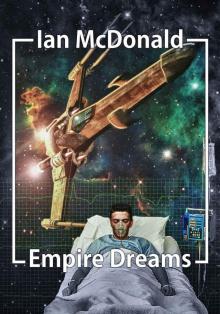 Empire Dreams
Empire Dreams The Menace from Farside
The Menace from Farside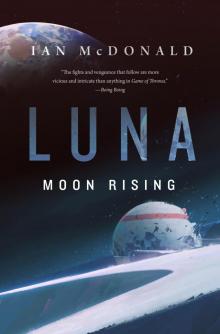 Luna: Moon Rising
Luna: Moon Rising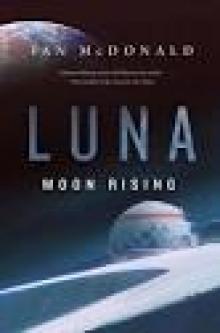 Moon Rising
Moon Rising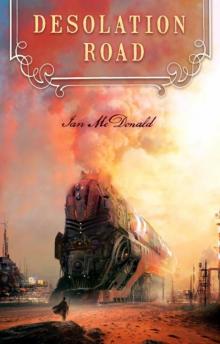 Desolation Road dru-1
Desolation Road dru-1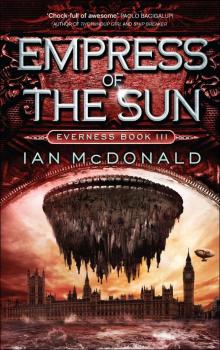 Empress of the Sun
Empress of the Sun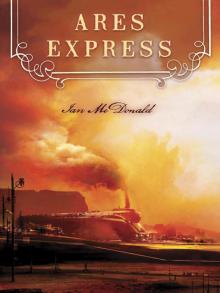 Ares Express dru-2
Ares Express dru-2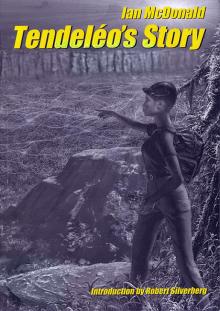 Tendeléo’s Story
Tendeléo’s Story River Of Gods
River Of Gods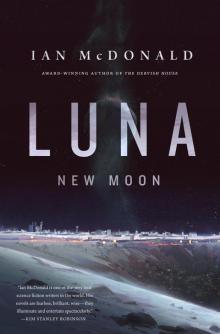 Luna
Luna![Cyberabad Days - [River of Gods 02] Read online](http://i1.bookreadfree.com/i1/03/29/cyberabad_days_-_river_of_gods_02_preview.jpg) Cyberabad Days - [River of Gods 02]
Cyberabad Days - [River of Gods 02]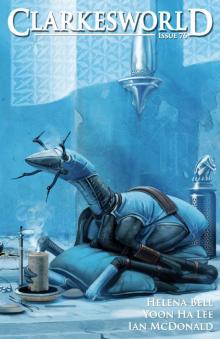 Clarkesworld Magazine Issue 76
Clarkesworld Magazine Issue 76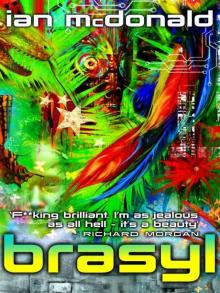 Brasyl (GollanczF.)
Brasyl (GollanczF.)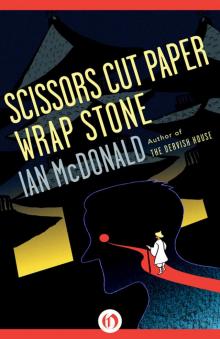 Scissors Cut Paper Wrap Stone
Scissors Cut Paper Wrap Stone Chaga
Chaga Time Was
Time Was Cyberabad Days
Cyberabad Days Be My Enemy
Be My Enemy Changa
Changa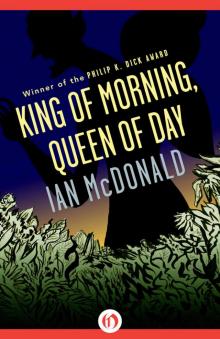 King of Morning, Queen of Day
King of Morning, Queen of Day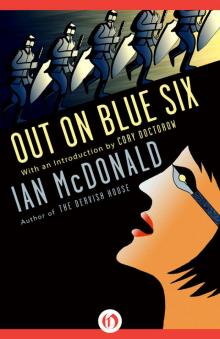 Out on Blue Six
Out on Blue Six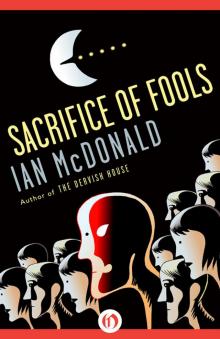 Sacrifice of Fools
Sacrifice of Fools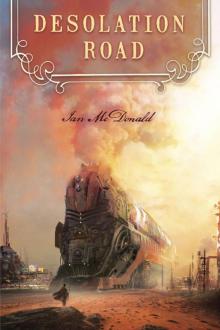 Desolation Road
Desolation Road Luna--Wolf Moon--A Novel
Luna--Wolf Moon--A Novel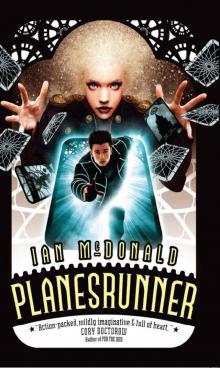 Planesrunner (Everness Book One)
Planesrunner (Everness Book One) Ares Express
Ares Express